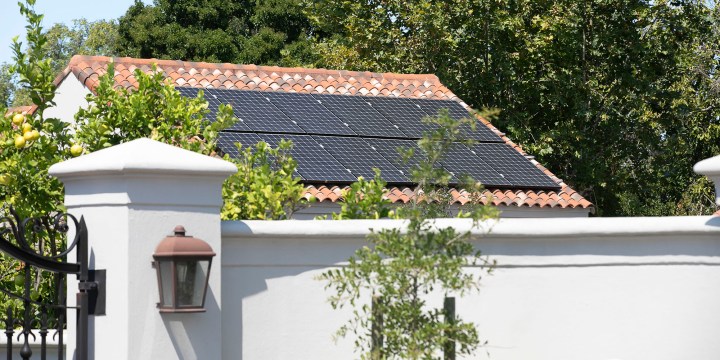POWER GRAB
Theft of solar panels on increase as criminals seize new opportunity

South Africa imported R31bn worth of solar panels from 2010 to 2022. This presents a market ripe for criminal activity and business is booming.
Although no statistics are available, solar panel theft is certainly on the rise, Rodney Taylor, the managing director of home automation company Guardian Eye, told Cape Talk radio recently
“Load shedding has created high demand and a massive black market for solar panels,” he said, adding that the panels are either stripped for components including copper or sold as is.
King Price client experience partner Wynand van Vuuren concurs that solar panel theft has become an unfortunate trend that is likely to escalate. According to Gaylor Montmasson-Clair, the facilitator of the South African Renewable Energy Masterplan, and assistant programme manager for sustainable growth at Trade & Industrial Policy Strategies, South Africa imported R31-billion worth of solar panels from 2010 to 2022.
This presents a market ripe for criminal activity and business is booming. The problem is global with pv magazine reporting that police in the UK observed a 93% rise in reports of solar panel-related crimes from 2021 to 2022. German solar security business Viamon told the magazine that more than 5,000 “major” solar panel thefts occur annually in Europe, with more than 400 in Germany alone.
Back on South African shores, insurers approached by Daily Maverick were coy when it came to sharing numbers, although most admitted that there was an increase in these types of losses.
Anneli Retief, the head of Dialdirect, says this emerging trend had led the insurer to recently launch a combo deal specifically designed to protect South Africans from power surge-related damage and solar system crime. Typically, you can get insurance cover for your solar panels and inverters under the category “buildings”, or under “home contents” if you don’t own the building.
Youlon Naidoo, the executive head of claims and procurement at MiWay, says although the insurer has not had any solar panel theft claims since May last year, clients are advised to install their panels with security bolts.
“Solar panels also have alarms that can be linked to the panel, to alert you immediately if someone tries to move the panel. Most panels also have specific serial numbers which can be tracked and circulated after a theft occurs,” he says.
Marius Steyn, personal lines underwriting manager at Santam, warns that you should upgrade your insurance cover when you install solar assets to avoid being underinsured in the event of a claim.
“When a solar power system is installed, it influences the value of the building and therefore the building sum insured should be increased to accommodate the value of the investment in the solar power system. If the insured value of the building is not equal to the current replacement value, underinsurance (principle of average) could be applicable in the event of a claim and the claim will not be paid in full,” Steyn explains.
Identifying a reputable installer
Steyn advises looking for credentials such as references of previous work and how long the business has been in operation. A reputable installer should provide a comprehensive quote detailing the scope of work, components that will be used in the installation as well as, importantly, after-sales services, warranties and guarantees.
They should also advise you of any potential issues that may compromise the installation and functioning of the solar power system before commencing the installation. If your building is damaged during the installation process, this should be covered by the installer under their contractors all risk insurance policy. Pre-installation inspection is crucial to ascertain that the building’s roof structure and rafters [are] not compromised, rotten or damaged so that the solar panel installation can still be carried out.
It’s essential to obtain a certificate of compliance when installing solar power generating systems as this is required by law and for the registration of the solar power generating system with the relevant municipality. This is something that any reputable installer will automatically provide.
Ernest North, the co-founder of the fully digital insurance platform Naked, says the platform has not “as yet” seen a significant rise in claims for stolen panels.
“Since solar panels are high-value items, we recommend that homeowners secure and insure them. With the ongoing energy crisis, high power costs and a growing second-hand market, we could see theft of panels continue to rise,” he says.
Bearing in mind that a number of these stolen panels end up on the black market, North warns that consumers should be extra vigilant when buying secondhand panels at bargain prices.
“Ask to see the original proof of purchase, which should also give you the details about any warranty remaining on the equipment,” he advises. DM
Best practice when installing and insuring your solar panels
Christelle Colman, the co-founder of Ami Underwriting Managers, provided the following tips:
- Use an accredited installer. The South African Photovoltaic Industry Association’s PV GreenCard programme for solar installers can assist in finding a reliable professional.
- Installations should comply with regulations and South African National Standards. The electrician should provide a Certificate of Compliance, confirming that the installation adheres to the necessary safety rules and regulations.
- Obtain municipal approvals. An accredited installer should be able to assist with this process.
- Increase building insurance. This will cover the replacement cost of the solar system in the event of theft or damage.
- Retain all invoices. This will facilitate claiming back the tax rebate.
Insure your alternative power sources for what it would cost to replace them with new equipment. Remember to factor in the cost of installation in your insured value. DM

















 Become an Insider
Become an Insider
….. and our insurance costs just escalate!!!!
… and the greedy criminals have another way of taking from productive citizens.
Law enforcement need to increase restrictions on scrap dealers who deal in copper recycling or scrap exports of copper and aluminum.